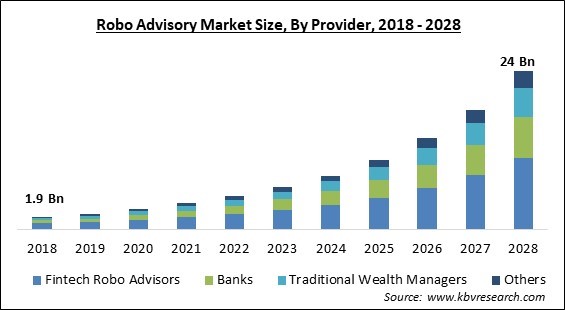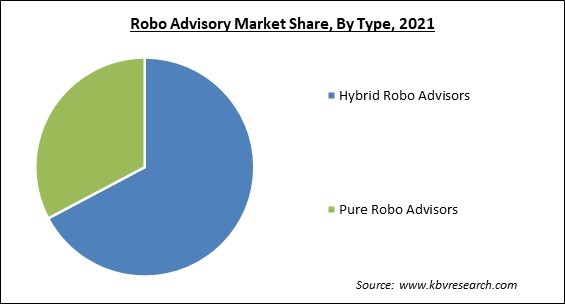The Global Robo Advisory Market size is expected to reach $24 billion by 2028, rising at a market growth of 29.9% CAGR during the forecast period.
The term robo-advisor refers to the algorithm- and computer-driven financial planning that involves very minimal human intervention. Additionally, the robo-advisor collects financial information from clients through the use of an online survey. This information includes the clients' present financial condition as well as their future financial aspirations. In addition, by making use of this information, robo-advisers can provide their customers with several benefits, including expedited account creation, portfolio management, and safety measures.

Several of the world's fastest-growing economies are putting pressure on regional companies to step up their testing and investigation of robo-advisory services. A subcategory of financial counselors known as robo-advisors or robo-advisers, robo-advisors provide clients with financial advice and administration of their investments online while requiring only moderate to low levels of human participation.
They offer digital financial advice based on mathematical principles or algorithms and supply it to customers. Programmers are responsible for encoding these algorithms into the software once they have been devised by data scientists, investment managers, and financial advisers. Because these algorithms are carried out by software, the provision of financial advice to a customer does not necessitate the involvement of a human adviser.
The program makes use of its algorithms to automatically allot resources owned by customers in a manner that is both manageable and optimized for either short-term or long-term investment. The level of personalization, discretion, engagement and human connection offered by robo-advisors is one of the criteria used to classify these digital financial advisers. There are approximately a hundred different robo-advisory services available.
COVID had a good effect on the robo-advisory business. Backend benchmarking, which analyses performance by opening portfolios at top robo-advisors, revealed that the majority of portfolios handled by digital advisors performed similarly throughout market fluctuations. The number of users on an online wealth management platform or robo-advising in wealth management has doubled as the coronavirus puts an increasing number of advisers into lockdown. From the perspective of wealth management organizations, advisers are managing customers who have been personally and financially impacted by the coronavirus.
Digitization has been one of the most commonly embraced solutions in the financial services industry for enhancing core processing capabilities and providing enhanced client services and insights. Moreover, almost fifty percent of financial services have been related to investments. They have been able to reach a big portion of the public that has access to traditional consulting owing to budgetary restraints, so filling this need. In recent years, the financial services business has been modernizing and aiding advising services.
In businesses such as asset management, banking, and insurance, the digital revolution is changing traditional business landscapes. FinTech, an acronym for financial technology, has evolved as a consequence of the ongoing evolution of technology. The wealth management (WM) business is undergoing profound change. A new generation of investors, molded by new technology and having lived through the last financial crisis, has introduced new criteria for the delivery of investment advice and products.
Robo-advisory software platforms are wholly reliant on technological systems, which might expose investors to possible risk circumstances stemming from cyberattacks or IT malfunctions or outages. If the instrument lacks sufficient protection, hackers may have several opportunities to steal data and funds. Because financial institutions rely on a great deal of vital and secret customer information, it is imperative to guarantee that employees implement the necessary security measures.
On the basis of Provider, the Robo Advisory Market is divided into Fintech Robo Advisors, Banks, Traditional Wealth Managers, and Others. The banks segment recorded a substantial revenue share in the robo advisory market in 2021. It is because banks are continually working to improve the quality of the experience, they provide their customers by digitalizing their products and services. The rise in popularity of digitalized solutions for opening a bank account, particularly among smaller financial institutions, is helping to feed the need for chat-based robo-advising.

Based on the End User, the Robo Advisory Market is bifurcated into Retail Investors and High Net Worth Individuals. The retail investor’s segment witnessed a substantial revenue share in the robo-advisory market in 2021. An individual investor is a non-professional investor who purchases and sells securities or funds that hold a basket of assets, such as mutual funds and exchange-traded funds. A retail investor is also known as an individual investor. Retail investors are also known as individual investors (ETFs). The majority of trades made by retail investors are conducted through either conventional or online brokerage companies, in addition to other forms of investment accounts.
By Service Type, the Robo Advisory Market is classified into Direct Plan-based/Goal-based and Comprehensive Wealth Advisory. The direct plan-based/goal-based segment garnered the highest revenue share in the robo advisory market in 2021. Investors place a high value on robo-ability advisors to provide them with features such as comprehensive goal planning, investment management, security features, and responsive customer care. Customers who use goal-based robo-advisors, that provide risk profiling and goal-based suggestions, can run scenarios on goal planning and are prompted to take actions that will increase their chances of success.
| Report Attribute | Details |
|---|---|
| Market size value in 2021 | USD 4 Billion |
| Market size forecast in 2028 | USD 24 Billion |
| Base Year | 2021 |
| Historical Period | 2018 to 2020 |
| Forecast Period | 2022 to 2028 |
| Revenue Growth Rate | CAGR of 29.9% from 2022 to 2028 |
| Number of Pages | 221 |
| Number of Tables | 420 |
| Report coverage | Market Trends, Revenue Estimation and Forecast, Segmentation Analysis, Regional and Country Breakdown, Companies Strategic Developments, Company Profiling |
| Segments covered | Provider, End User, Service Type, Type, Region |
| Country scope | US, Canada, Mexico, Germany, UK, France, Russia, Spain, Italy, China, Japan, India, South Korea, Singapore, Malaysia, Brazil, Argentina, UAE, Saudi Arabia, South Africa, Nigeria |
| Growth Drivers |
|
| Restraints |
|
Region-wise, the Robo Advisory Market is analyzed across North America, Europe, Asia Pacific, and LAMEA. The North America region procured the highest revenue share in the robo advisory market in 2021. It is anticipated that the existence of several significant firms, including Betterment, the Vanguard Group, Inc., and others, would contribute to the expansion of the robo-advising business in the United States. For example, The Vanguard Group, Inc. announced that it will be launching its robo-advice service in September 2019.
Free Valuable Insights: Global Robo Advisory Market size to reach USD 24 Billion by 2028
The market research report covers the analysis of key stake holders of the market. Key companies profiled in the report include Wealthify Limited (Aviva plc), The Charles Schwab Corporation, Betterment LLC, Fincite GmbH, Wealthfront Corporation, The Vanguard Group, Inc., Ellevest, Inc., Ginmon Vermögensverwaltung GmbH, SigFig Wealth Management, LLC and Social Finance.
By Provider
By End User
By Service Type
By Type
By Geography
The global Robo Advisory Market size is expected to reach $24 billion by 2028.
Financial services are experiencing rapid digitalization are driving the market in coming years, however, The Risk Involved with Robo-advisory Software, such as cyberattacks or IT errors restraints the growth of the market.
Wealthify Limited (Aviva plc), The Charles Schwab Corporation, Betterment LLC, Fincite GmbH, Wealthfront Corporation, The Vanguard Group, Inc., Ellevest, Inc., Ginmon Vermögensverwaltung GmbH, SigFig Wealth Management, LLC and Social Finance.
The High Net Worth Individuals market has acquired maximum revenue share in the Global Robo Advisory Market by End User in 2021; thereby, achieving a market value of $14.0 billion by 2028.
The Fintech Robo Advisors market is leading the Global Robo Advisory Market by Provider in 2021; thereby, achieving a market value of $10.7 billion by 2028.
The North America market dominated the Global Robo Advisory Market by Region in 2021; thereby, achieving a market value of $8.8 billion by 2028.
Our team of dedicated experts can provide you with attractive expansion opportunities for your business.

